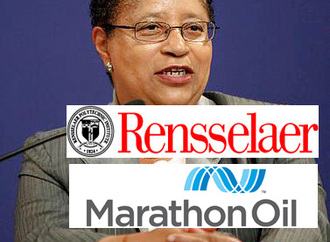-
Dr. Shirley Jackson, please stop working for big oilDr. Jackson, you are being asked to step down because of the impact that Marathon Oil has on environmental health issues at a local, national, and global level. LOCALLY Only 8 miles from your home and RPI, for example, the health and welfare of people who live in Albany (including RPI students) are at risk because highly volatile Bakken Crude -- which Marathon Oil produces -- rolls through their communities -- in rail DOT-111 rail tankers that the National Transportation Safety Board itself says put communities at risk. Explosions and fires have already wreaked havoc in communities around North America, including the massive blast in Lac Megantic, Quebec that killed 47 people. These “bomb trains” filled with volatile crude pass within hundreds of feet of densely populated residential areas, and often sit for days on tracks just behind public housing complexes. NATIONALLY The shale gas boom is also expanding fossil fuel production and transport, and creating new problems and risks across the United States. Marathon Oil is active in the Eagle Ford Shale Play near San Antonio, for example. More than 7,000 new oil and gas wells have been drilled in the region since 2007, and thousands more are planned, resulting in dramatic air pollution and associated ill health. Many RPI students and alum are directly impacted because of shale gas developments in their home communities. Meanwhile, research demonstrating often irreversible damage to the environment and human health because of the long chain of activity associated with the shale gas boom continues to build. RPI could play an important leadership role helping translate this research into public policy, firmly grounded in science. GLOBALLY Fossils fuels also create tragic global challenges, with Marathon Oil again bearing notable responsibility. The United Nations reports that that climate change already kills hundreds of thousands of people per year, and that the world’s poorest people are the most vulnerable. Climate change is also creating political instability, driving people across borders and creating diplomatic crises that show no sign of resolution. Fossil fuels -- and Marathon Oil -- are deeply implicated in these tragedies.402 of 500 SignaturesCreated by Igor Vamos
-
Support the Heathrow 13 and stop the new runway!13 climate protesters are facing prison to silence protest against new runways which would wreck Government policy to protect us from catastrophic climate change. The Paris agreement underlines the need to cut emissions now. Aviation is the fastest growing source of carbon emissions and the only way to reduce emissions from aviation to a safe level is to reduce the number of flights. Despite David Cameron’s ‘no ifs, no buts’ election and manifesto promise to not build a new runway following massive public outrage at the proposals, the Government is now breaking its promise. There is more than enough aviation capacity for people’s annual holidays and the declining number of business flights. Airport growth is driven by a minority of frequent fliers who take the majority of UK flights to second homes and tax havens. Meanwhile, emissions from aviation are destroying people’s lives. People in the Heathrow area, who already have to breathe illegal levels of air pollution and suffer intolerable noise, would now see their homes destroyed. People across the UK have been flooded at Christmas, and every year hundreds of thousands more people die due to climate change - mostly in poor countries in the Global South, the people least responsible for emissions. The Government is expected to make its decision on whether to expand Heathrow or Gatwick – or neither, if we are successful – this year. It’s one or the other: build new runways or protect us from climate chaos. The people in the Global South who are dying due to climate change already have no voice in the debate. We can show them that jailing peaceful protesters will not silence those of us who do.3,006 of 4,000 SignaturesCreated by Plane Stupid
-
Americans should be able to buy the 7 seat Prius V available in the rest of the worldHi - I, like many of us eco-conscious parents would love to have a fuel efficient vehicle to carry 7 passengers but are stuck with mini-vans or SUVs if we want to carry a larger group. The only fuel efficient 7 seat car on the market is a Tesla, starting at $70,000, this vehicle is out of the range of many. Imagine my delight when I found that the Toyota Prius V offers a 7 seat option - a 40 mpg 7 seat car! And then I found this model is offered world-wide but not in the Americas. First, the excuse that the batteries were different - the US model used a cheaper larger Ni -metal hydride battery which did not allow the space for the third row seat. This changed with the 2016 models - all Prius V's now use the smaller lithium ion battery - When I heard of this upgrade I waited anxiously for the new release of the 2016 model. Surely we could now have the 7 seat option? But no! Toyota still does not offer this package even as an option - and when I have inquired from corporate sources they claim it is because "Americans don't want a small 7 seat car." Interestingly, I hear the opposite from nearly every parent I mention this to. The response I get is "Wow! I would get that in a minute!" Even a floor salesperson at our local Toyota exclaimed "if there was a 7 seat Prius, we couldn't keep it on the lot!" I believe that Toyota is trying to force consumers into more expensive, less fuel efficient cars to improve their bottom line - now that the batteries are the same there is simply no reason the 7 seat model could not be offered as an option...except it might decrease their sales of Highlanders and mini-vans. (This is the option the company gave me in emails and phone calls) Toyota needs to be called out on this. Imagine the improvement there would be in emissions if just a percentage of families switched out of their 7 seat SUVS into a eco-friendly hybrid car.... -ps - as for the argument I have occasionally read that the reason Toyota does not release the 7 seat Prius in the US "is because American safety laws are too stringent for a 7th row." Poppycock! When the V was released with 5 seats and no 7 seat option in the US markets, spokespeople never used different safety requirements as a reason - what is sited in numerous articles was the higher cost to use the smaller battery or lack of space for "Americas typically larger build." Further EU and Australian safety standards are hardly lax.968 of 1,000 SignaturesCreated by Julie Bolton
-
Reduction of Plastics in Panda ExpressPlastics that we use and fail to recycle end up in the landfills, and often times into our oceans where they congregate into gyres which the Gyre Cleanup Project describes as a “naturally occurring vortex of wind and currents that rotate in a clockwise direction in the northern hemisphere and [counterclockwise] in the southern hemisphere.” These gyres attract the plastics to the center of the gyre and, over the years, have created what we call the Great Pacific Garbage Patch. Once reaching the center, and even before, the plastics begin to break down into microplastics that enter the ecosystems and end up concentrating in the top of the food chain through biomagnification this can cause the animals to starve or can kill them through lead poisoning. The best way to fix this problem is through preventing the plastics from ever reaching the oceans, and reducing our overall use of plastics. This is easiest in cases like Panda Express where their plastic products are easily replaced by less harmful alternatives, like cardboard boxes and reusable containers.13,138 of 15,000 SignaturesCreated by Ben Pearson
-
Ask South Yorkshire Pension Authority to invest ethically and divest from fossil fuelsSince its formation in 1988, South Yorkshire Pensions Authority has worked hard on behalf of its nearly 140,000 members to provide them with a safe and secure future in retirement. Yet while ever it invests in unethical companies or industries, including fossil fuels and tobacco, the Authority is putting these achievements at great risk, by undermining long-term commitments to maximise pension fund investments and to provide good service to fund members. (The over 300 employers contributing to the Authority's schemes are also at risk, as it is they who will ultimately meet any shortfall in the cost of providing scheme benefits to retired members.) The South Yorkshire Pensions Authority (SYPA) which manages the Local Government Pension Scheme has £259m invested in companies with fossil fuel and fracking connections such as Shell, BP and Glencore, 4.25% of its £6.1bn holdings (as at Mar 2016). It also holds investments in companies which fail to balance their focus on profit with the social and environmental responsibilities expected in the modern day. We believe it is morally indefensible to invest in companies that destroy our climate and so leave to our children a world where life as we know it is unsustainable. And that it is financially irresponsible to invest in such a high risk sector where the experts agree that the assets are currently wildly overstated and where share prices are certain to plummet.701 of 800 SignaturesCreated by Janet paske
-
No public money for the Euro-Caspian Mega PipelineLast week, as the European Games begin in Baku, I was detained in Azerbaijan for speaking out against the fossil fuel funded Azeri regime. I was lucky, I was released. There are over 100 people facing years in Azeri jails - activists, journalists, filmmakers, academics and lawyers - anyone who criticises the regime. People like Rasul Jafarov. Rasul is a young, charismatic activist who founded the Sport for Rights campaign. He planned highlight the number of political prisoners in Azerbaijan during the Games, however a few weeks after starting the campaign Rasul himself became a political prisoner. The Euro-Caspian Mega Pipeline will keep the repressive Aliyev regime in power by ensuring that fossil fuel revenues keep flowing to the country's ruling elite. The EBRD's loan to Lukoil will further entrench the Aliyev regime, buying them influence and money and making it making it even harder for those organising for democracy in Azerbaijan. The Euro-Caspian Mega Pipeline is also a disaster for the climate. It will lock Europe into fossil fuels for the next fifty years and pump over 2 billion tonnes of CO2 into the atmosphere. If Europe is to avert the worst impacts of climate change, both at home and elsewhere, we must stop this pipeline. On 22 July the EBRD needs to say no to funding the Euro-Caspian Mega Pipeline and send a signal to the growing resistance along the route of the pipeline that the era of fossil fuels is coming to an end.2,741 of 3,000 SignaturesCreated by Emma Hughes
-
Faça com que a exploração de Fracking seja banido do BrasilDe onde vem e para onde vai a água utilizada na exploração do gás de xisto? Essas questões geram frequentes polêmicas e debates, uma vez que produtos químicos são utilizados nesse tipo de extração. De acordo com o conselheiro da Sociedade Brasileira para o Progresso da Ciência (SBPC), o pesquisador Jailson de Andrade, ainda faltam estudos criteriosos sobre o assunto. Andrade alerta, sobretudo, para a carência de informações que identifiquem onde as jazidas de gás natural estão localizadas e se estão perto de aquíferos importantes. “Os estudos realizados até agora são contestados. Não se sabe para onde vai a água contaminada por produtos químicos utilizados na exploração do gás. Ainda não há uma experiência no Brasil que possa se tomar como base. Falta informação”, diz. Apesar de os dados ainda serem imprecisos, existem companhias ansiosas por entrarem em processos licitatórios de exploração do gás de xisto no Brasil, e outras vislumbrando lucros para despoluir a água e as áreas porventura afetadas pela sua extração. O pesquisador observa, no entanto, que não há tecnologia para despoluir os aquíferos, caso eles sejam atingidos. Para Andrade, esse é um dos pontos cruciais a serem resolvidos. “A exploração do gás de xisto sem critério afetará a água sob nosso solo, já que a rocha a ser fraturada (o folhelho Irati) encontra-se a algumas centenas de metros abaixo do aquífero Guarani, na bacia geológica do Paraná”, detalhou. O Guarani é uma das maiores reservas subterrâneas de água doce do mundo. Tem a capacidade de abastecer, de forma sustentável, muitos milhões de habitantes, com trilhões de metros cúbicos de água doce por ano. No Brasil, está no subsolo dos estados de São Paulo, Goiás, Minas Gerais, Mato Grosso, Mato Grosso do Sul, Paraná, Santa Catarina e Rio Grande do Sul. Na visão de parlamentares, estudiosos e pesquisadores, essa riqueza pode estar ameaçada por uma enorme pressão econômica, a exemplo do que já ocorre nos Estados Unidos. A exploração de xisto utiliza o método de fraturação hidráulica, chamado em inglês de “fracking”. Trata-se de injeção de toneladas de água, sob altíssima pressão, misturada com areia e produtos químicos, com o objetivo de quebrar a rocha e liberar o gás nela aprisionado. Nos EUA, 90% dos poços de gás de xisto são perfurados com a utilização dessa técnica. Esse tipo de extração utiliza vinte vezes mais recursos hídricos do que as técnicas convencionais. Com isso, as pequenas cidades norte-americanas nos arredores dos poços de gás de xisto enfrentaram problemas de falta d’água para consumo e agricultura, além da contaminação dos aquíferos subterrâneos e das reservas de água potável. Mas a falta de água não é o único problema. Destacam-se ainda, a excessiva circulação de caminhões, a injeção de fluidos que provocam pequenos abalos sísmicos, a ausência de regulamentação, a presença na água de pequenas quantidades de produtos químicos e metais pesados cancerígenos, bem como a acumulação de metano, que pode provocar explosões. “Há um estudo da National Academy of Science, nos Estados Unidos, que mostra que, em 141 poços de água potável na Pensilvânia, quanto mais próximo de áreas de exploração de gás não convencional, maior a quantidade de metano (tóxico e inflamável) na água”, informou Jailson. “A controvérsia na literatura é se isso já existia antes ou se é resultado da perfuração para obtenção de gás”, observou Andrade. Nomenclatura equivocada – Há uma longa e equivocada tradição brasileira de se chamar o folhelho (shale) de xisto (schist). Apesar disso, os especialistas esclarecem que é incorreto chamar o gás de folhelho de gás de xisto: “O xisto é uma rocha metamórfica que sofreu grandes transformações geológicas, não possibilitando a geração de gás; o folhelho, por sua vez, é uma rocha sedimentar com grande quantidade de matéria orgânica que dá origem ao gás”, explica Jailson Andrade. O gás de folhelho, encontrado em áreas de permeabilidade relativa e também chamado de “gás de xisto”, é um dos três tipos de gases não convencionais cuja ocorrência não está associada a bolsões de gás armazenados a partir das camadas de petróleo. Estas produzem o gás fóssil convencional, encontrado na plataforma continental e em outras regiões do Brasil. Os demais gases não convencionais são o confinado (tight gas), com ocorrência em rochas impermeáveis ou de baixa permeabilidade, e o metano associado a camadas de carvão. Camila Cotta, especial para o Jornal da Ciência/SBPC EcoDebate, 14/08/20147 of 100 SignaturesCreated by 350.org Brasil
-
Support President Anote Tong of Kiribati for the 2015 Nobel Peace PrizePresident Tong’s country, the Pacific island nation of Kiribati, is one of the first places to confront sea level rise and other devastating real-life consequences of climate change. President Tong is worthy of the Nobel Peace prize because he plays a significant and constructive role in meeting the challenges of climate change by taking every opportunity to help create a new understanding of global warming in industrialised nations. President Tong has joined with other leaders of Small Island States to lobby for the United Nations to address Climate Change as a threat to the security of the world’s people. He has shown himself a builder of peace and reconciliation by continually striving to strengthen co-operation between nations and encouraging dialogue at international forums. He promotes protection of the environment as a means of advancing peace and harmony among nations. From the assemblies of the United Nations to meetings of world leaders he has provided an inspirational example of principled non-violent leadership. After the failure of Copenhagen in 2009, President Tong organized the Tarawa Climate Change Conference which brought together small islands states and large polluting nations to find common agreement, now enshrined in the Ambo Declaration of 2010. In addition, under his leadership Kiribati has designated and is working towards the establishment of the Phoenix Islands Protected Area (PIPA). It will be among the world’s largest environmentally protected areas. Both the Ambo Declaration and the PIPA demonstrate his leadership in showing that small nations can lead the world in taking effective action on climate change. More recently, President Tong’s leadership in setting up the Coalition of Atoll Nations, bringing the frontline most vulnerable states together, is evidence that President Tong is a catalyst the world needs now in the lead up to the climate conference in Paris in December 2015.429 of 500 SignaturesCreated by Vincent Sicari
-
OIL FREE SEAS AustraliaThose we have elected are failing the Australian people and they are failing the natural world. They are allowing the cruel and unnecessary slaughter of sea creatures and the ruin of undersea habitats. We demand our Governments manage natural resources and the global commons solely in the best interests of present and future citizens. Our oceans should not be exploited by individual nations or corporations but held in trust for the benefit of all and for future generations.787 of 800 SignaturesCreated by OIL FREE SEAS Australia
-
No pipeline in NHWe value our state and want to maintain our beautiful towns, nature, and liberties. This pipeline is contrary to these ideals.1,334 of 2,000 SignaturesCreated by Diane Varney-Parker
-
Stop climate denial in West Virginia’s classrooms!West Virginia recently adopted new education standards based on the Next Generation Science Standards, which were developed to provide comprehensive, research-based science education that includes climate change -- but not before sneaking in some shocking alterations. The new standards, altered last minute at Board member Wade Linger’s request, cast doubt on climate change as a settled science. If the Board goes through with the new standards, West Virginia kids will get a dose of climate denial in their classrooms -- all because one Board member doesn’t believe in human-induced climate change. All West Virginia kids deserve an accurate, 21st-century education, and they shouldn’t have to learn false science based on standards that contain blatant errors and misrepresent the scientific consensus on climate change. There’s still time for the Board of Education to fix its errors, because the new standards won’t go into effect until next year. Sign this petition to tell the Board to correct all information related to climate change in the new standards for K-12 students in West Virginia -- and give kids the education they deserve. For more info: Climate-Change Education Advocates Denounce 'The False Science From West Virginia' | Huffington Post: http://buff.ly/1x4Zsph Climate-Change Education Advocates Denounce 'The False Science From West Virginia' | Salon: http://buff.ly/1x4ZkpN304 of 400 SignaturesCreated by Zoë Wong-Weissman

-
Say No to Dirty Coal Bailouts in Ohio!Coal generates 70 percent of electricity in Ohio -- while polluting the air, harming human health, and contributing to climate change. It's time to phase out dirty, outdated power plants that run on coal. But Ohio’s largest electric utilities — AEP, Duke, and FirstEnergy — want to lock in this dirty source of energy for years to come. In pending cases before the Public Utilities Commission, they’re trying raise customers’ electric bills to pay for coal plants that are no longer competitive in today’s market. Earlier this year, AEP alone requested to charge Ohio citizens $117 million to keep two coal plants built in the early fifties up and running. Now, AEP has upped its request to cover six coal plants. Duke Energy is asking for a similar amount, but for an even longer period of time. Meanwhile, FirstEnergy is trying to force customers to pay for all generation and maintenance costs of its 55-year old Sammis coal-burning power plant and the Davis-Besse nuclear plant (guilty of numerous accidents and violations over its 35-year lifespan), just to name a couple. The proposal covers 15 years. At the same time, FirstEnergy is also cutting its customer energy efficiency programs. It’s wrong to ask people in Ohio to pay more for dirty energy they don’t want, especially when it harms public health and the climate. If the Public Utilities Commission approves these requests, it would block progress on clean, renewable energy sources by forcing them to compete in a market skewed toward propping up outdated, dirty energy. It would lock in dirty coal in Ohio for years to come, when the state should be transitioning to clean, renewable sources of energy. Now is an especially important time to speak up, because some of these decisions are expected by the end of 2014. If you live in Ohio, sign this petition to urge state leaders to stand strong against dirty coal and defend our rights to a clean, safe, and livable future.870 of 1,000 SignaturesCreated by Zoë Wong-Weissman










.jpg)

